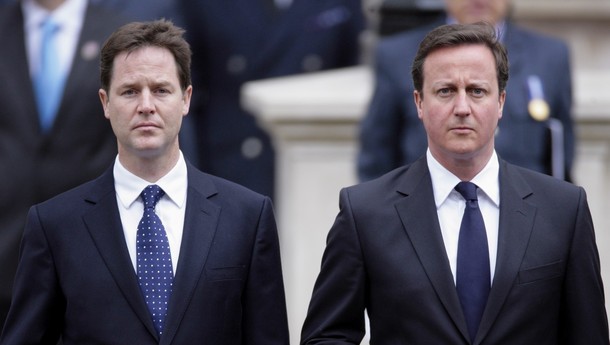
Yesterday, in a bold gambit to secure a progressive Labour-Liberal Democrat coalition, Gordon Brown announced his resignation as prime minister and party leader. He failed. All signs point to an imminent power sharing arrangement between the plurality winning Conservatives and the third place Lib Dems.
Former Sun political editor George Pascoe-Watson is tweeting that the Lib Dems would get "six cabinet posts" with Clegg as "deputy PM." And Joe Murphy, Paul Waugh and Nicholas Cecil of the Evening Standard report that Brown will resign tonight.
Brown’s unexpected resignation yesterday was shrewd and perhaps selfless (see Norman Geras for a dissenting voice on the latter). Still, while the messy outcome left unclear what the British electorate wanted, it was quite clear what they didn’t want: Five more years of Gordon Brown. To be sure, as The Atlantic‘s Andrew Sullivan points out, "63 percent of Britons did not want a Tory government after 13 years of Labour." But that’s a function of multiple alternatives.
It really couldn’t have gone the other way. It would have been simply bizarre to have run as an alternative to Labour and then form a government that kept Labour in charge. And, CSM‘s Ben Quinn reports, David Cameron knew it. He announced this morning that it was "decision time" for the Lib Dems, adding, “I hope they will make the right decision to give this country the strong, stable government that it badly needs and badly needs quickly."
Further, Times chief political correspondent Sam Coates reports, the Tories negotiated as if they knew Clegg had little real leverage.
Several baubles had indeed been dangled before them, including fixed-term Parliaments, proportional representation to select new members of the Lords and the possibility for PR for council elections. But on the defining issue of voting reform, the promise was more limited. It turned out that the only Tory pledge was to initiate a free vote on legislation for a referendum — a measure likely to fall at the first hurdle and, therefore, unacceptable to most Lib Dem MPs. “It was very woolly,” said one.
MPs were surprised. The Lib Dem negotiators reported that they had reluctantly agreed to support a Tory plan to redraw every Commons constituency to ensure they are the same size. “The number of seats the Tories would gain by equalising constituencies would be roughly similar to the number they would lose through AV,” said one MP. “So it was curious the Tories didn’t seem to want to budge.”
Brown’s major hope was that the Lib Dem desire for electoral reform — a move from first-past-the-post to proportional representation so that the Lib Dems’ seats in Commons would more accurately reflect their share of the vote — would be enough of a lure. Or that he could play competing offers against one another.
But, as noted, the Tories are adamantly against the idea, arguing (correctly in my view) that such an arrangement would have actually exacerbated the problems in forming a government demonstrated in this election. The Brits are accustomed, after all, to the winner of the elections to show up at 10 Downing the next day ready for work, with moving vans parked outside so that the old and new occupants can transfer their belongings.
Indeed, it seems, even a desperate Labour wasn’t quite ready to go all in on this proposal. Coates with Philip Webster for the Times:
Lib Dem negotiators were reported to be unimpressed with a new offer from Labour to stage a referendum on proportional representation after the next general election, while legislating for an AV system in the current Parliament.
Mr Clegg’s lieutenants were telephoning doubting MPs to tell them that the Tory offer of a referendum on AV was the safer one to accept.
Further, it seems, Labour would rather lose than win a Pyrrhic victory:
Senior Liberal Democrats told The Times that Labour’s ranks seemed increasingly unenthusiastic about a deal. Many Labour figures want to go into opposition and blame the Conservative and Lib Dems for impending cuts in public spending.
The Spectator‘s Alex Massie argues that none of the parties has covered themselves in glory with these negotiations. Brown’s gambit was undercut by his plan to delay his exit to September, which meant that Clegg — and likely the leaders of two other small parties — would have to agree to a coalition with a prospective PM in place. Clegg, he argues, has undermined his moral argument by on the one hand announcing that the election outcome gave the Tories the first right to form a government and then immediately trying to cut a deal with Labour. As for the Conservatives:
Cameron has been remarkably calm. At present if there’s no Tory-Liberal deal then it seems as though the party will not hold him responsible, preferring to train their guns on the Lib Dems and Labour. Nevertheless one does wonder if he really had to offer a referendum? Maybe he did but it was unfortunate that it seemed as though Cameron was reacting to Lib Dem demands rather than anticipating them. Some Tories, I suspect, wonder what part of the family silver he will sell next to get a deal, any deal.
Then again, perhaps the Tory leader is playing a longer, subtler game. All this positioning and manoevering today wasn’t so much about what happens this week or even in the next few months. Every part of it had an eye on the next election. And in that contest at least I’d argue that the Lib Dems are now in both a weaker position than they were on Friday and a tougher one than they needed to be.
Presumably, though, success in forming a government will have a cleansing effect.
James Joyner is managing editor of the Atlantic Council. Photo credit: Getty Images.
Image: clegg-cameron.jpg
